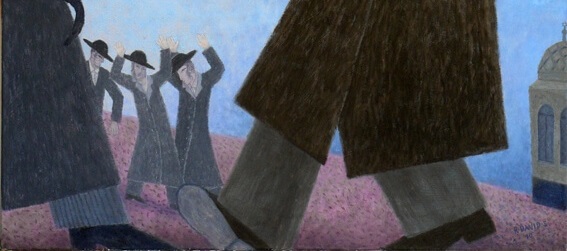
“אוֹר זָרֻעַ לַצַּדִּיק; וּלְיִשְׁרֵי-לֵב שִׂמְחָה.”
תהילים צז:יא
“Light is sown for the righteous, and joy for the upright in heart.” (Psalm 97:11)
Based on this verse, the Talmud in Ta’anit 15a makes the following conclusion: the tzaddik (the righteous) has light, but the yashar (the upright) is blessed with joy. Why is this?
In general, what is the difference between these two levels of righteousness, the tzaddik and the yashar?
First Light and then Joy
When these two terms are mentioned together, we find that ‘light’ is mentioned before ‘joy.’ For example, it says, “The Jews enjoyed light and joy” (Esther 8:16). This order indicates that ‘joy’ is the goal, while ‘light’ is a means to that goal.
We may understand the difference between a tzaddik and a yashar through an interesting question that Maimonides raises in Shemonah Perakim (ch. 6). Who is greater: a person who is naturally inclined to do the right thing? Or a person who must work to overcome negative habits to do what is right?
The better person, Maimonides explains, is the individual with ingrained noble traits and good inclinations. People who have purified their hearts and refined their character so that their desires naturally correspond with God’s Will — they truly cleave to God and His ways.
Those who must struggle against evil inclinations, however, suffer from internal conflict. Their actions are not in harmony with their desires. It is only the Torah, whose teachings they have not fully internalized, that enlightens their moral darkness and guides them on the proper path. Their lives in this world are a constant battle; they only attain serenity and true happiness in the next world.
The Tzaddik and the Yashar
Now we may understand the verse. Tzaddikim conquer and correct (matzdik) their actions, through the guidance of the Torah. They are guided by light — but it is a “sown” light. Like a seed planted in the soil, it will only sprout and fully reveal itself at a later time.
Since tzaddikim spend their lives laboring to overcome evil inclinations, they are unable to experience the joy of their enlightened path. By fulfilling God’s Will through Torah and mitzvot, they acquire this “planted” light, whose benefits they will reap at the time of reward. It is through the Torah’s light that they will merit the joy of the future world, enjoying the splendor of the Shechinah in the World to Come. “Light is sown for the righteous.”
The yashar, however, is a different story. The phrase yishrei-lev literally means “those whose heart is straight.” Their hearts and desires are at one — “in line” — with God’s Will. Thus they are able to enjoy the future happiness of the World to Come already in this world. Already now there is “joy for the upright in heart.”
(Adapted from Olat Re’iyah vol. II, p. 17)





